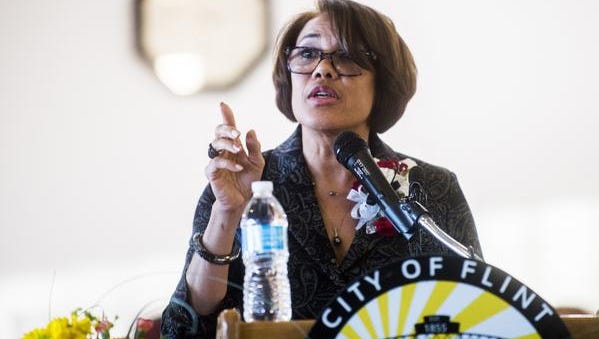Weaver: State 'lies' about Flint's drinking water violations
 Leonard N. Fleming
Leonard N. Fleming
Flint Mayor Karen Weaver said Tuesday state officials cannot force her to sign a consent agreement seeking to make fixes to her city's water system and challenged them to "bring it on" and take her to court.
The battle stems from the state's August 2017 sanitary survey that found the city's water system has "significant deficiencies," including with the water distribution, finances, "security" and "operations and management." The city hasn't fixed the problems within 120 days as required by state law, according to the Michigan Department of Environmental Quality.
But Weaver told The Detroit News the DEQ is making "false accusations or lies" about Flint's compliance with state and federal drinking water laws, among other allegations. And she views the proposed consent order to repair the problems as retaliation against her vigorous protest when Gov. Rick Snyder ordered in April the end of the state's free bottled water deliveries to the city.
"We have been meeting our requirements every step of the way," Weaver said in an interview.
"There are some other things that need to be done by the end of this month and some things aren't required to be done until the end of the year. But every step of the way, we've done what we're supposed to do."
Flint buys treated water from the Great Lakes Water Authority, but the city's treatment plant performs additional treatment for acidity levels, corrosion control and chlorine, according to the state.
In a letter dated Monday, Michigan Assistant Attorney General Richard Kuhl threatened Flint with federal legal action if it doesn’t enter into and comply with a consent agreement addressing the city’s outstanding violations. Kuhl wrote that the state would prefer voluntary cooperation.
In letters dated in May and this month, the state department said the violations of the Michigan Safe Water Drinking Act mean the city needs to sign a consent decree in which state officials outline how the city must take to fix the problems. It would include having a "permanent or contractual" manager to oversee control program activities.
In a June 4 letter, state Drinking Water and Municipal Division Director Eric Oswald wrote that correcting the violations help ensure Flint's public water supply system prevents "contaminants from entering" the drinking water and prevents "imminent and substantial endangerment of public health."
Flint is still recovering from a lead contamination water crisis first discovered in the late summer of 2015. The city's water has tested below federal lead standards for nearly two years, but many residents still refuse to drink from their taps.
In the June 4 letter, Oswald said state officials had summarized in a March letter the "corrective actions that had been completed" and gave "dates to complete
other corrective actions."
"The matter at hand is working together to address these deficiencies to help ensure that the city continues to have quality drinking water," DEQ's Brown said in a statement.
While the department stands by its administrative consent order, she said, "we are reviewing the mayor’s response. And again, what’s most important is working together with the city to reach solutions in the interest of public health, and we are committed to that."
Weaver is still considering legal options against the state over the end of free bottled water shipments. But she said Tuesday she might even go back to the federal judge overseeing the replacement of Flint's lead service lines because the state has indicated that the funds may be withheld.
"That's why we said all of this is retaliation," Weaver said. Almost half of the pipes in Flint have been replaced, she said.
"I just believe this is absolutely retaliation and then they want to blame us for what they did," she said, referring to the water crisis that Snyder's task force was caused by state-appointed emergency managers and negligent DEQ officials.
"Now wait a minute, you all created this mess. Don't forget: You all poisoned us."
In her June 11 response letter, the mayor was pointed is saying the DEQ's proposed consent order "is unnecessary and unwarranted."
"I am also troubled by the timing of this proposed enforcement action, in the wake of the cessation of state funding for bottled water in Flint," Weaver wrote. "During two years of collaborative remediation efforts, an ACO has not been necessary."
She added that she sees "this ACO as a deliberate and willful misuse of the DEQ's authority for political purposes and not as a good faith effort to address the issues faced by the City of Flint."
The mayor said she hoped to bring more contractors in to begin the next phase of pipe replacement but state officials, she said, want everything to be hydro-vacuumed to save money that would return to the state. Weaver said she would rather see any savings go toward new plumbing Flint's people.
"We're really trying to, and what I've been trying to do all along, is work together," she said about the state. "And put differences aside for getting what's best for the people."
lfleming@detroitnews.com
(313) 222-2620
Twitter:@leonardnfleming